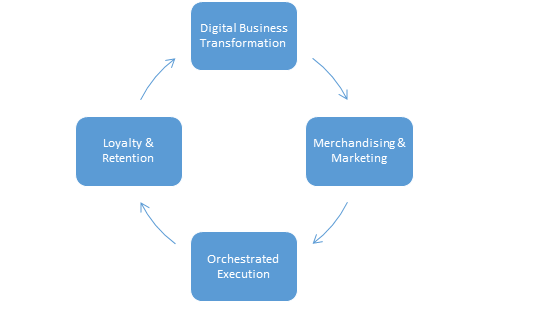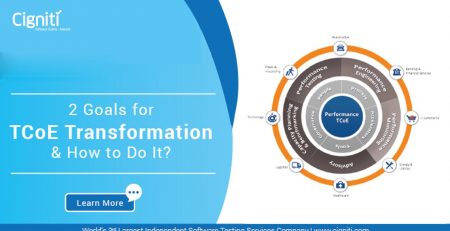Can Agile Testing Assure Retail Sector the Next Phase of Growth?
Can you imagine driving through a retail store for your groceries? Or an Autobot delivering your orders at your doorstep? Retail biggies have done unimaginable innovations to woo the right mix of customers, so anything on these lines is absolutely imaginable.
Whether it is pop-up stores, magic mirrors, digital price tags, or engaging kiosks, it is becoming a task to keep up with the digital revolution in the retail space. At the same time, it is impossible to stop working towards and investing in new ideas. There is no chance that the sector can lose its charm after such humungous investments in setting it up.
While the opportunities are compelling, there are operational, security, and logistics related challenges that are immobilizing the industry’s growth. Retail giants from America and Europe dominate the extensive list of names in the retail space.
Name any retail biggie across the globe – Wal-Mart Stores, Costco Wholesale Corporation, Kroger Company, Walgreens Boots Alliance, Tesco PLC, Carrefour SA, Metro Group AG, The Home Depot, or Target, each one has a peculiar set of challenges to go through.
Likewise, famous online brands like Amazon are making big noise and substantially impacting the growth story of the established retail giants. But even a player like Amazon cannot escape the scare of creating an Omni-channel impact. It is trying to take a reverse route by creating physical stores to cater to a particular mix of audience.
Interestingly, this practice is being considered across various online brands who are setting up their customized physical stores.
GDP is growing and there is a rise in disposable income amongst the developing economies as well. Strikingly, the market segmentation in terms of choices and other demographics is widening and further driving growth indicators for the Global Retail industry. Industry figures (source: RESEARCHANDMARKETS) estimate a whopping $20, 002 billion in 2017 with a CAGR of 3.9% over the next 6 years (2012-2017).
New payment gateways like m-wallet are adding up to the options in terms of shopping and pricing for customers. This is again leading to concerns for the brick and mortar stores on how do they get the required footfalls to the store on any random day during the week? Technology has always been an enabler on all fronts – online or offline. However, when technology comes into play, there is a constant need for testing it and ensuring that it delivers the right experience.
Retail continues to grow as a sector with some real promises for all small and big brands. It is definitely an interesting space to explore for the future. Digital Transformation is coming up as a way to relate to these changing phases in retail sector with focus on activities related to Social, Media, Analytics, and Cloud (SMAC). Whether you are a brick and mortar store or an online portal or both, there is no other option but to build a digital perspective.
In such a scenario, CIOs are turning out to be trusted advisors to the senior management for taking the venture through the digital business transformation journey. They are expected to guide the businesses on technology adoption, acceptance, value generation and overall building a robust digital foundation.
There is a serious need today to prioritize and enable technology investments for effective data management, eventually, create value chains to make this data competitive to deal with volatile, unpredictable and taxing business environment.
Additionally, it is critical to build robust consumer interface and test them for uncertain scenarios and for customer satisfaction in the digital space.
Agile Methodology has been empowering testing programs to bring flexibility in the overall QA approach. When it comes to agile approach, the entire team gets responsible for the outcome. Testing teams and development teams work cohesively into units to evaluate the code and commit.
- It leads to better communication, where both the tester and developer work together resolve bugs. Additionally, daily scrum sessions help in resolving issues quickly.
- Testers work with developers on the same team, as a result, they get immediate feedback and then the developer is able to fix the bug, while the code is fresh on the list.
- The time gap between coding and testing is less, so the developer will not have time to add new code, making it easier to find the bug.
- Agile segments the teams into shorter sprints with a goal and small sets of features. So, the turnaround time is faster and there is possibility of adding new features during the process.
- Agile works on user stories that have a business focus. When the focus is on the needs of the real users, it adds value and the process remains feedback-based.
Agile is known for enhancing quality, as it works for projects that need constant innovation and where the goals are normally not set. This helps provide key business benefits, especially for the retail sector, where the applications are dynamic and change is the way of making things better for the end customers.
These are Gartner’s four retail key initiatives that work cohesively to determine the future of Digital Retail. These four factors in all possible ways encapsulate the overall challenges and opportunities surrounding the retail segment.
We did some industry analysis, spoke to our clients in the segment, studied some Analyst reports, and thus could gather what industry leaders and retail specialists consider as challenges for the Retail sector.
- Data and Data management: The concern is, how can such large volumes get integrated and work synchronously for the retailers.
- Accessibility! Retail experts have analyzed that retailers are struggling with ways to maximize inventory and ensure that the inventory is accessible at the right time and in the right volumes.
- Technology adoption and investment: Various technologies and system upgrades are creating challenges for the IT departments, leading to confusion and a complete mayhem in terms of its acceptance.
- Real time retail: Retail models keep changing and it is very much necessary to adopt them in order to determine growth. The idea is to offer holistic experience.
- Empowering within: Whether it is online or offline, empowering the internal staff or store associates with the technology tool is absolutely important and remains an absolute challenge.
- Point of Sale Security: How do we ensure that the data shared at PoS terminals is secure and cannot be misused for any malicious reasons? Ecommerce/M-commerce is getting popular, which is intensifying this scare.
- Sustaining employee efficiency: Digital Transformation calls for exhaustive investments and human effort.
The challenges look tough. So be it!
The opportunities look brighter. These are some great opportunities that technology can bring for retail – adopting Omni-channel processes and systems, widening market segmentation, improving the offline Sales process, and effective Inventory Management.
Our take!
Cigniti collaborated with a Multi-billion dollar Gift Card and merchandise manufacturer to deliver Agile Software Testing services for enhanced Testing efficiency. Interestingly, the client runs a $4 billion business with greeting cards and other products sold across over 40,000 retail stores across the U.S.
Additionally, the company also manufactures crayons, produces cable media shows and has a stake in a real estate development firm. The client needed a platform independent authoring of automation scenarios, where the automation scenarios could support execution on different OS versions on the same platform.
Cigniti has been a trusted testing partner by many enterprises for various stages of adopting Agile. So the team took an Agile Development approach on this project and planned the Testing strategy.
The Cigniti team used the overloading concept to overcome platform independent authoring of scenarios. The team performed all testing related activities including authoring and execution of test cases & scripts.
Cigniti’s overloading concept helped reduce a lot of effort while authoring automation scenarios to support test execution across platforms. Additionally, the client was able to author scenarios on same platform to support different OS versions with minimal efforts.
Retail is vibrant, interesting, and engaging, and will never ever see a dearth of demand till the human race decides to employ surrogates and go into hibernation!
Connect with us to adopt Agile methodologies within your overall QA and testing approach, bring efficiency, and add value to the overall business objectives.






Leave a Reply